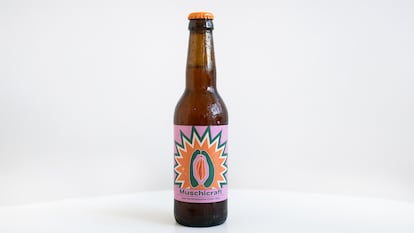The beer that is brewed in violation of the misogynistic laws of 50 countries
Vienna-based Muschicraft has set out to create the world’s first feminist beer

Is there such a thing as feminist beer? It does exist: it is produced by the Vienna-based Muschicraft company. The bottle label features a vulva and, according to Sophie Tschannett, its creator, it breaks various misogynistic laws in countries such as Russia, India, Italy, and the United States. The Germanic neologism muschicraft (in English, “vaginal power”) came to Tschannett, a Viennese artist in her thirties who also works as a social worker, five years ago when she was pedalling down the Danube with a friend. “She told me that her bosses hadn’t assigned her an important project because she is a woman. She was very angry and told me her plans in this regard. I said, ‘I think they’re great. And they clearly arise from your unstoppable vaginal power.’” The new word gave rise to a few stickers that the author stamped over the Austrian capital… But that was where it ended.
A year later, her passion for beer led her to research the topic. “I soon realized that this market was dominated by men,” Tschannett recalls. “Everything surrounding this drink is masculine and heterosexual: the executives are men, the people who make it are men, and above all, the advertising is almost exclusively focused on men. I wondered how in the 21st century no relevant brand offers a beer for everyone: for women, trans or queer people, and for them too.”
This is how Muschicraft (a play on words with craft beer) was born, a pale ale produced with local ingredients, with notes of melon and grapefruit and a 5.2% alcohol content. Its goal is to break clichés, such as that women do not drink beer, or that men look more masculine when they do. And part of its profits go to feminist projects such as Autonome Österreichische Frauenhäuser (Association of Autonomous Women’s Shelters in Austria) or Women for Women.
In November 2023, the German communications agency HeimatTBWA contacted Tschannett with an idea that went one step further: “The most illegal beer,” a new label to be distributed by the small Berlin brewery Vagabund. “It was a perfect match, because our mission was to show that gender inequality still exists,” says Tschannett. In order to create it, she says laws from 50 countries were broken, which, among other things, prohibit women from producing alcohol, working night shifts, cleaning machinery, lifting heavy barrels, or driving trucks. What is the most absurd rule that she has broken? “They are all stupid, but if I had to choose, it would be one from Wyoming in the United States. Although it is unlikely to be enforced, a woman who is drinking is not allowed within five feet of a bar there,” she reveals. “This one is especially ridiculous.”
The vulva-shaped brand image shouldn’t shock anyone, but it does. “Many people find it offensive, even though other companies’ advertising is completely sexist,” Tschannett laments. The logo is intended to remove the taboo surrounding the vulva and distance it from its association with pornography. “After all, it’s a natural part of the body and there’s no reason to be ashamed of it,” she concludes. “To change that relationship, you needed a powerful and irritating statement. Sometimes, you still need to provoke to draw attention to certain issues. And I had the feeling that by putting a pussy on the label, a lot of people would go crazy and find it difficult to deal with.” Prost!
Sign up for our weekly newsletter to get more English-language news coverage from EL PAÍS USA Edition
Tu suscripción se está usando en otro dispositivo
¿Quieres añadir otro usuario a tu suscripción?
Si continúas leyendo en este dispositivo, no se podrá leer en el otro.
FlechaTu suscripción se está usando en otro dispositivo y solo puedes acceder a EL PAÍS desde un dispositivo a la vez.
Si quieres compartir tu cuenta, cambia tu suscripción a la modalidad Premium, así podrás añadir otro usuario. Cada uno accederá con su propia cuenta de email, lo que os permitirá personalizar vuestra experiencia en EL PAÍS.
¿Tienes una suscripción de empresa? Accede aquí para contratar más cuentas.
En el caso de no saber quién está usando tu cuenta, te recomendamos cambiar tu contraseña aquí.
Si decides continuar compartiendo tu cuenta, este mensaje se mostrará en tu dispositivo y en el de la otra persona que está usando tu cuenta de forma indefinida, afectando a tu experiencia de lectura. Puedes consultar aquí los términos y condiciones de la suscripción digital.








































